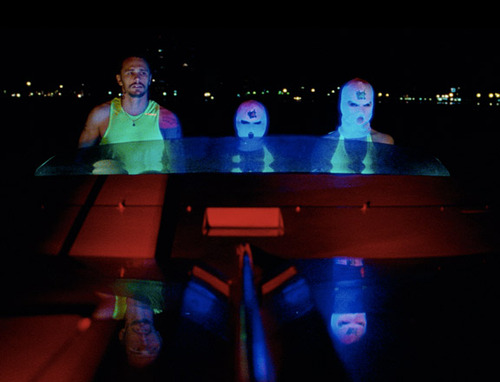
Like his adoptive patron Werner Herzog, Harmony Korine is concerned with how people behave when culture recedes. But where Herzog is obsessed by characters who test themselves and summon their strength to fight the wilderness and its elements, Korine is drawn to people who have simply been left behind. His heroes and heroines have been remaindered, along with a few other traces of Americana. Gummo takes place in a town devastated by a tornado. The isolationist commune of Mister Lonely is filled with celebrity impersonators of bygone Hollywood stars. Trash Humpers is what it sounds like. Always, everyone has abandoned you; your world is just the stuff they didn’t want.
Spring Breakers begins with four college students–Faith, Brit, Candy, and Cotty–stranded on campus after the wealthier students have gone off to party. The four girls do headstands in the hallway; count their money (not enough to get away); and mimic acts of fellatio with fake guns and other stand-in penises. Eventually, Brit, Candy, and Cotty decide to rob a fast-food restaurant. Faith abstains.
The style of Spring Breakers is dissociative. Speech and image drift away from each other and back again; voice-over narration floats over elliptical montage sequences. The scene of the robbery is shown twice; the first time the view is from outside the restaurant, as the getaway car circles the joint and pop music blares on the radio. The violence of the scene is apprehended by the audience at a remove, as it is by Faith, who’s uncomfortable hearing about the robbery, but game to use the money to go to Florida and party.
After the girls go broke and get arrested, they’re bailed out and taken up by Alien, a full-time hustler and part-time rapper played with expert camp histrionics by James Franco. “I’m not from this planet, y’all,” insists Alien as he beckons the girls into his car.
Faith doesn’t recognize Alien’s criminal underworld as continuous with the fun times the four girls set out to have in Florida. By this point in the movie, we’ve already witnessed Faith’s trepidation at first hearing of the initial robbery. And she’s already displayed a more intense discomfort when hearing of the crime a second time: In the middle of drinking and singing Britney Spears in a convenience store parking lot, Brit, Candy, and Cotty launch with giddy abandon into a more detailed version of how they robbed the fast-food joint. This time we hear the noises and threats and see the fear on the victims’ faces. Faith is shocked—she hadn’t spent much time imagining what got them to Florida.
After being taken aside and given a bizarre, sexually charged lecture by Alien, Faith finally decides to catch a bus home and return to the boredom of college life.
In Book 9 of The Odyssey, Odysseus tells of sneaking into a Cyclops’s home to find “a dragging rack that sagged with cheeses, pens crowded with lambs and kids.” The race of Cyclopses “neither plow nor sow by hand,” though “wild wheat and barley grows untended, and wine-grapes, in clusters, ripen in heaven’s rain.” At one point, Odysseus says, the Cyclops “clutched at my companions and caught two in his hands like squirming puppies to beat their brains out, spattering the floor.” Mythical lands lush with greenery and flush with mead are often held together by psychotic violence. Those who live there are alien creatures capable of withstanding the combination.
Franco’s Alien lives in a mansion, and while there are no “pens crowded with lambs and kids,” there are many other silly luxuries, like “Scarface on repeat, y’all” and “dark tannin’ oils.” Mostly though, his home is filled with guns and piles of money.
Alien seems startled when Brit and Candy grab one of his AKs and force him to perform oral sex on it, promising, all the while, to kill him. The scene—the most unforgettable in the film—goes on for a long time, with Alien increasingly convinced of his own impending death and, simultaneously, seeming to enjoy more and more the violent simulated fellatio. When Brit and Candy remove the gun from his mouth, and it becomes clear they’re not going to kill him, Alien exclaims, “I knew y’all were my soul mates!” We, the audience, may have misrecognized these characters, but Alien did not: they’re Cyclopses, too! It’s more obvious when they have their ski-masks on.
In Spring Breakers, Korine’s concerned with re-associating our world and reasserting an ancient connection mostly lost on contemporary US culture. The American Pastoral is not at odds with the crazy violence of America. It’s merely its most natural setting. In our myopic pop culture, which keeps our world neatly compartmentalized, Korine forces us to reckon with the true price of Paradise and the true nature of Ecstasy. And if we don’t like it, we’d do best to take the early bus back home.
Tom McCormack is a writer and curator living in Brooklyn. His work has appeared in Moving Image Source, Rhizome, and the Brooklyn Rail.




